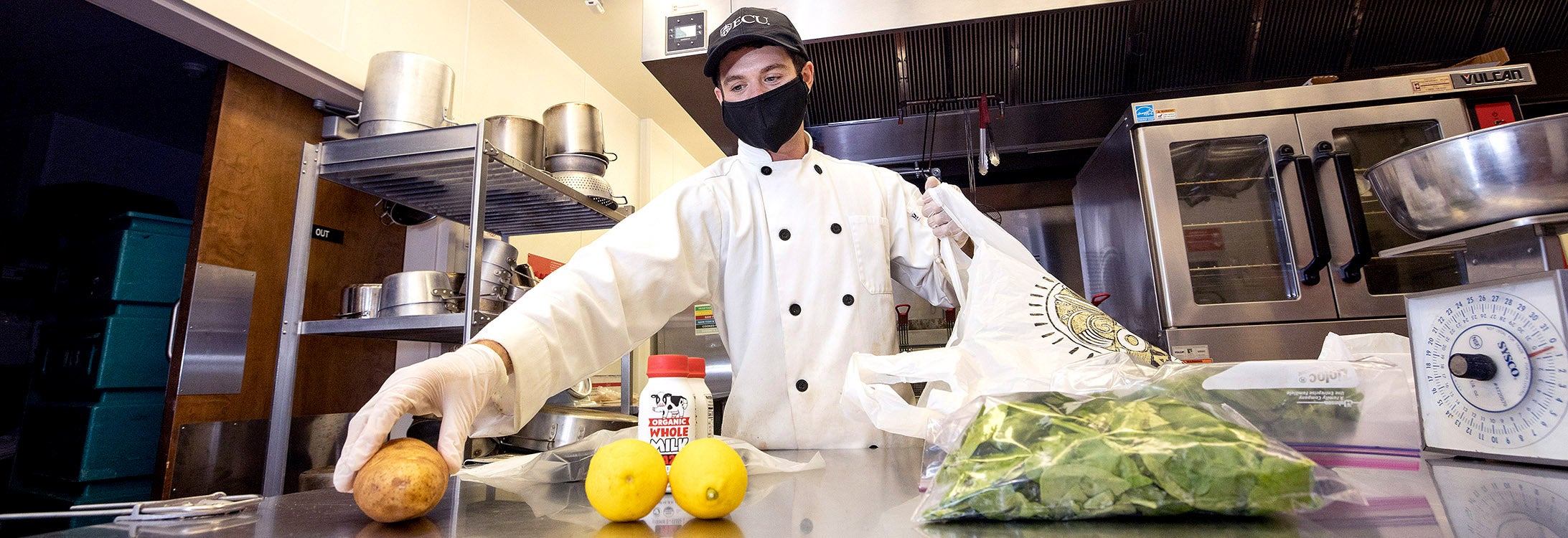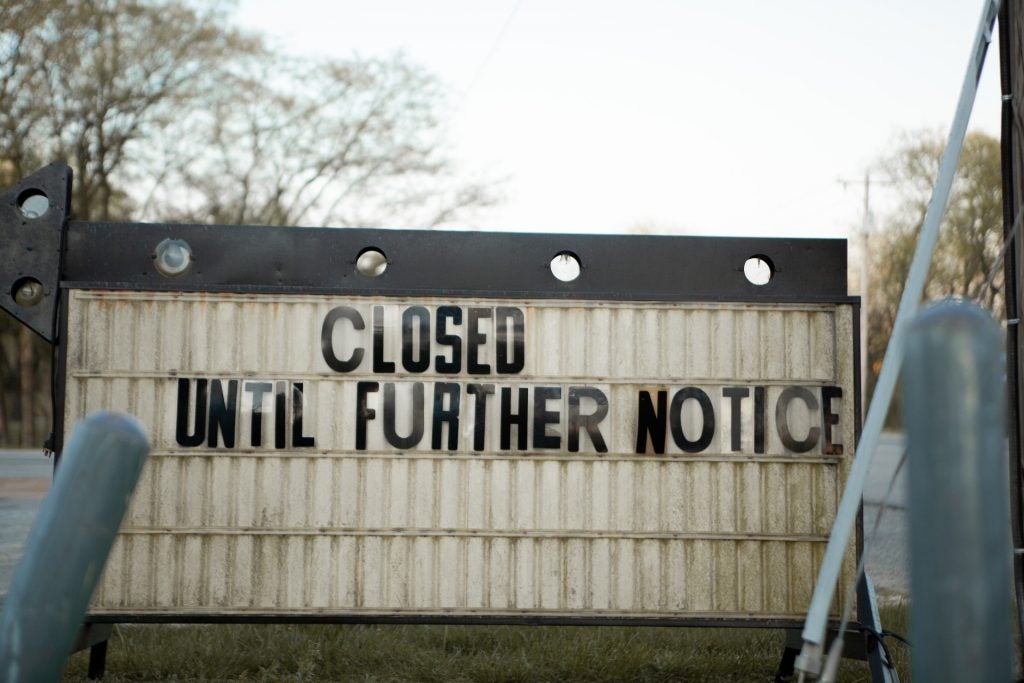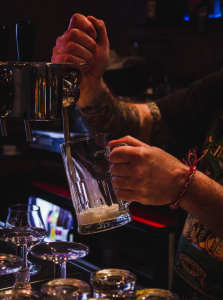March 19, 2021
Yes, Virginia. Hospitality and tourism will survive

Andrew Kensey puts food items in a bag for students to pick-up for a virtual food preparation course.(Photo by Rhett Butler)
by Dr. Robert O’Halloran, director, School of Hospitality Leadership
It has been said of the hospitality industry that it will be difficult, if not impossible, to return to what it was before the pandemic. Some say it will return and improve, while others see a different future altogether. Our optimism is enhanced with the first distributions of the vaccine. Like our industry partners, the School of Hospitality Leadership (SHL) will progress and adapt to the hospitality and tourism industry’s new operating models and higher education needs.
Where are we? How are we doing? Surviving is a challenge.
The hospitality industry is closely aligned with hospitality business education. The lodging and foodservice industries have been our strongest partners and recruiters. They provide us information that we can act on moving forward.
The American Hotel and Lodging Association (AHLA) tells us the lodging industry has lost more than 871,000 direct hotel jobs nationwide and more than 1.9 million direct hotel and related jobs six months into the pandemic. AHLA also tells us that 28,000 hotels have been closed due to low demand or foreclosure due to the pandemic.
On the foodservice side of the issue, National Restaurant Association (NRA) data from 2020 stated nearly 1 in 6 restaurants have closed permanently or long-term and almost 3 million employees are still out of work. The industry was on track to lose $240 billion in sales by the end of 2020. Tom Bené, NRA president & CEO, stated that “for an industry built on service and hospitality, the last six months have challenged the core understanding of our business. Our survival for this comes down to the creativity and entrepreneurship of owners, operators and employees.” Luna (2020) shared comments from Susan Robertson, president, and CEO of the American Society of Association Executives (ASAE). This pandemic has put meeting professionals under extreme pressure to adapt and completely reimagine programming and logistics for countless events. It’s incredibly impressive to see the creativity and the transition to virtual meetings. Her second message is that contingency planning is going to be crucial in everything we do. We need backup plans for everything because who knows what disruptive event is around the corner.
Luna (2020) shared comments from Susan Robertson, president, and CEO of the American Society of Association Executives (ASAE). This pandemic has put meeting professionals under extreme pressure to adapt and completely reimagine programming and logistics for countless events. It’s incredibly impressive to see the creativity and the transition to virtual meetings. Her second message is that contingency planning is going to be crucial in everything we do. We need backup plans for everything because who knows what disruptive event is around the corner.
For those of us in hospitality management education, COVID-19 has meant less recruitment, less placement and interaction with lodging and restaurant companies and fewer available internships. Our alumni, along with many others, have been furloughed and or lost their positions permanently. It is hard to recruit students to hospitality business careers within this context.
However, the research stated above does provide us opportunities for our curriculum and the connectivity with our industry that is focused on technology, virtual platforms and more. Industry training and certificate courses are perhaps other channels for higher education to pursue.
Bené’s statement goes to the core of what we in higher education need to understand. The survival of the hospitality industry will revolve around creativity and entrepreneurship. Our industry needs to think of our students as the next era of leadership tightly aligned with innovation. Besides teaching sound, hospitality business skills, we need to build leaders who think outside the box, innovative, and build creative and robust teams. Our faculty have adapted their courses, and our curriculum has changed with the times. AHLA (2020) research notes that 85% of those in the hospitality industry currently want to remain in our industry (AHLA Foundation, 2020). That is good news for hospitality business higher education.
Industry research shows that hospitality remains the worst-hit industry, month after month (AHLA Foundation, 2020). Noting specific trends, 4 out of 10 hotel employees are still not working, and consumer travel remains at an all-time low (AHLA Foundation, 2020). Many of the leading companies — e.g., Marriott — have furloughed and separated many new and longtime employees.
Conversely, the same research shares some encouraging news that includes bright spots such as:
- Lower-level service hotels versus upper-class hotels are performing better. Lodging and lower-level service (limited service) properties are leading the way in terms of performance.
- Interstate, Small Town and Suburban versus urban destinations and resorts. People traveling in the U.S. are typically choosing auto travel. Therefore, they are looking for accommodations near the interstate highways and the smaller markets versus the larger cities and destinations.
- Resorts (smaller destinations versus larger). Some resort properties are performing better than their larger competitors, and these properties are most likely in secondary resort destinations. One can note that there is some movement in construction and renovation. The latter could be described as old beach or resort motels, smaller in terms of several rooms, outside entrance doors, limited common space, limited needed interaction with staff etc. One example, the Loggerhead Inn in North Carolina, illustrates their renovation during a pandemic. (https://www.starnewsonline.com/story/news/2020/12/01/renovated-loggerhead-inn-reopen-surf-city/6460054002/).
- Transient versus Group. Travelers who are willing to get on the road are short stay and considered transient. Group business is still struggling and the concept of “virtual meetings” is in play.
- Weekends versus Weekdays (Leisure versus Business) The majority of the lodging business is focused on the weekend and people getting away.
- Smaller versus larger cities Small cities appear to be leading the way in terms of destinations. Second- and third-tier cities and locations are seen as less crowded and therefore safer.
- Suburbs (regional) versus Central Business Districts/Downtown The opportunity here is for the suburban cities and towns to attract visitors to their locations.
- Domestic versus International destinations Domestic travel is the focus, and international destinations are still a long way off for many.
- Drive to versus Fly to destinations (local, closer to home) Do we remember staycations? Stay closer to home and drive to destinations near home. We, as Americans, often look past our attractions to travel. This ties directly to smaller locations/cities, resorts and short trip travel.
- Short haul versus long haul (small versus large airports) If travelers can convince themselves to fly, smaller airports with access and services are more attractive than the large hubs.
- Parks and Beaches, wide-open spaces, outdoor tourism Travelers in pandemic time share discovered the outdoors. Locations with access to trails, walkways and scenic beauty are increasingly attractive. Vacation management rental businesses, Airbnb and others are being sought out as channels to provide accommodations for families. The access is individual, and the transactions with owners and managers are almost always primarily virtual.
(Adapted from AHLA Foundation, 2020).

The Umstead Hotel and Spa is a smaller resort destination that could be fare better than their larger counterparts (photo by Cliff Hollis)
What will be the new normal?
Vaccines are now being shipped and administered, and there seems to be a light at the end of the current crisis tunnel. The question now being asked is, “What will be the new normal?” Higher education thinks of online learning options and solutions, virtual meetings, conferences, and trade shows and perhaps a return to old-style renovated lodging structures, i.e., the beach / small resort motels. The advancement of vacation management rental options and the continued entrance of lodging brands into this segment will be future options. On the food and beverage side, take out, delivery and outside dining are options for all levels of service. In some cases, small quick-service operations are thriving via drive-thru pickup and closed dining rooms. Upper-level service restaurants also have, in many cases, adapted to take out and or delivery options.
For meetings, conventions and special events, things may be different for a long time. For example, virtual sales appointments, virtual meetings, and perhaps virtual conferences will become part of the permanent mix of offerings and options. Our SHL Career Fair went virtual in Feb. 2021 via the Handshake platform. The challenge was to attract recruiters and students. Twenty-eight employers from six states and 100 students attended the event. Our message for companies focused on how we educate and prepare service management professionals in an economy dominated by the service industry. We continued our focus on hotels, restaurants, resorts, clubs, and meeting and event planning, but we expanded that focus to other industries that value service, including retail management, health care management, sports management and human resources.
One segment that appears to be progressing is the club management segment. Private city, country and golf clubs have continued to hire employees. The National Golf Foundation reports that rounds played in the U.S. are up by 50 million year-over-year — a remarkable statistic that factored in spring 2020 shutdowns that canceled up to 20 million rounds (Tucker, 2020).
In higher education, the SHL is uniquely positioned as leaders of hospitality and tourism online learning. The SHL continues to receive job announcements and postings and calls for intern applications. ECU has always been at the forefront of this delivery channel, and we see online students and coursework as a potential growth segment for our recruitment efforts. Individuals working in our industry can remain employed and to continue and ultimately finish their education all online.
Next Steps: Everything revolves around service.
The hospitality industry will return in force, and its operating models and tactics will adapt to the changes in our world. Many people want to travel, attend weddings, eat at restaurants, vacation, stay at diverse lodging businesses and interact and socialize with old and new friends in public settings. The action plan to provide these and other services is a work in process. Sean Kennedy, executive vice president of Public Affairs for the National Restaurant Association, stated that “investing in an industry that consumers love and that powers the economy is a good business and economic move for Congress as they search for the biggest bang for their recovery buck” (NRA, 2020).
The coronavirus pandemic has accelerated lifestyle trends and created new ones. Millennials who have typically preferred the big-city lifestyle have decided the burbs aren’t so bad. The magnetic pull of expensive cities like New York and San Francisco has weakened (Tucker, 2020). This lifestyle realization can positively influence the clubs and the hospitality industry in general. Private clubs that have continued to succeed in these troubled times do so by adapting to changes in membership and creating safe environments for their members. New members, represented in the millennial generation, will demand modern and innovative programs and activities that professional managers at private clubs can provide. For the hospitality industry, it can mean a sustainable market of job opportunities for our graduates.
The return to the “new normal” will mean greater attention to price and value relationship expectation of consumers and will be accomplished with greater attention to service. It also means our students/graduates will need to make thoughtful choices about careers. Their options are now different from before but just as viable. They could select a hospitality career path in technology, social media, human resources, sales, revenue management, development, and operations in multiple hospitality and greater service industry segments.
 The education we provide has already started to adjust and been enhanced with what is being described as “reskilling,” which incorporates the knowledge and application of new safety standards to the hospitality and tourism product offerings and the delivery of a high-quality service experience. One of the keys to hospitality and tourism business education is that we have a focused industry that wants to engage. Our students are taught to view the hospitality business through the eyes of a general manager who sees the interrelationships and interconnectivity of each department in an organization and who incorporates and utilizes the traditional functional business disciplines to reach a common goal. They apply finance, accounting, marketing, and information systems principles to hospitality business operating models. Students are taught and asked to see how all these business disciplines fit and work together to create a whole business.
The education we provide has already started to adjust and been enhanced with what is being described as “reskilling,” which incorporates the knowledge and application of new safety standards to the hospitality and tourism product offerings and the delivery of a high-quality service experience. One of the keys to hospitality and tourism business education is that we have a focused industry that wants to engage. Our students are taught to view the hospitality business through the eyes of a general manager who sees the interrelationships and interconnectivity of each department in an organization and who incorporates and utilizes the traditional functional business disciplines to reach a common goal. They apply finance, accounting, marketing, and information systems principles to hospitality business operating models. Students are taught and asked to see how all these business disciplines fit and work together to create a whole business.
As a school, we focus on hospitality and tourism graduates. Due to their education, these business-minded leaders are flexible enough to branch out beyond traditional career paths with their experiences and internships. Graduates and interns have and continue to work for retail service operations, grocery chains, health care venues, hospitals, recruiting and human resource companies. Anecdotally, recruiters have touted our students as good matches for their businesses. Retail operations hired many hospitality employees when the pandemic and lockdowns began. Health care is also a very viable option. Hospitals are about health care, but their infrastructures include accommodations, housekeeping, food service, and specialty services and programs. As infrastructure, this mirrors many lodging operations, therefore a good match for a hospitality business graduate.
The hospitality and tourism education industry, I feel, has two issues it needs to address: sustaining the lodging and industry and educating other industries that the business leaders coming out of hospitality and tourism programs can indeed step into any industry and make a profound difference.
We are not a dead discipline. We are needed, and our graduates will prove it.
References
American Hotel and Lodging Association (2020). State by state breakdown: Estimated hotel closures and additional job loss if Congress doesn’t pass another stimulus bill, https://www.ahla.com/covid-19-resource-center, [Accessed 12-16-20].
AHLA Foundation (2020). October, Hotel industry workforce trends & industry overview: Career development meeting with Educators, M. Anderson, Foundation Program Manager, S. Weir, Sr. VP Career Development, C. Alexander, Program Manager Career Development.
Luna, R. (2020). We Must Take Pandemic Lessons Learned and Bet Big on Our Future, Aug 24, https://www.mpi.org/blog/article/we-must-take-pandemic-lessons-learned-and- bet-big-on-our-future, [Accessed 12-17-20].
Meeting Planners International (MPI) 2020. Pandemic Meeting & Event Certificate, Navigate the next normal for event strategy in a post-pandemic world, https://www.mpi.org/education/certificate-programs/pandemic-meeting-event-certificate/ [Accessed 12-17-20].
National Restaurant Association (2020). 100,000 Restaurants closed six months into pandemic: Without government investment, thousands more could close in next six months, https://d15k2d11r6t6rl.cloudfront.net/public/users/Integrators/c2036c03-dbf6-4270-99c5- 7afb8a06e2b9/OKRA/FINAL%20Member%20Impact%20Survey%20%234%20091420. pdf [Accessed 12-17-20].
Pamer, B. (2020). Feeling Your Pain, https://www.pcma.org/feeling-your-pain-covid-19-challenges/, [Accessed 12-17-20].
Tucker, B. (2020). The Year Club Life Roared Back, GolfPass, December 10, https://d15k2d11r6t6rl.cloudfront.net/public/users/Integrators/c2036c03-dbf6-4270-99c5- 7afb8a06e2b9/OKRA/FINAL%20Member%20Impact%20Survey%20%234%20091420. pdf, [Accessed 12-17-20].
- Categories:
- School of Hospitality Leadership
